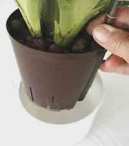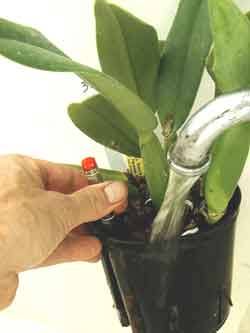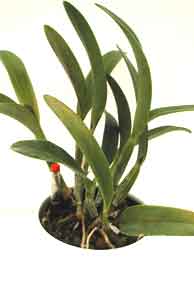

After Transplanting Cattleya | |||||
The most important plant care tip for Cattleya after transplanting is DO NOT OVERWATER! In nature, Cattleya grow in the trees and on rocks with their roots exposed to the elements. Their roots are acustomed to good air circulation and they dry out quickly after rain showers. The LECA pebbles in our Hydroponic System are excellent for Cattleya roots. They drain quickly and won't decompose or compact over time, promoting maximum air flow at the roots. | 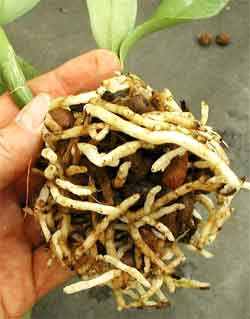 Healthy cattleya roots growing in hydroponics | ||||
Watering New Cattleya Transplants Cattleya transplants might take a little time adjusting to their new home. (This is especially true if you're transplanting during the cooler winter months when new growth is slow.) During the first 4-6 weeks water new transplant sparingly. Just pour a KLN solution of 2 TBLS per gallon through the root system. Don't allow standing water at the base. We're not using the water gauge yet - except as a handle to lift the plant.
| |||||
| After the Transplant - What to Look For | |||||
New growth means your plant has
adapted to hydroponics. Now you can start using the water
gauge to help establish your
watering schedule. Remember, cattleya don't like constant moisture so
be sure to
allow plenty of time for the system to dry out completely between
waterings. It's
better te error on the dry side here.
| 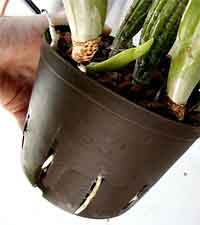 New roots pushing out the
bottom of the culture pot is another good sign (this will take several
months). Also, notice root growing vertically in the upper left corner
near my thumb. This is normal. Healthy roots don't always grow
down
inside the pebbles. | ||||
 | Most Cattleya form entirely new root systems after transplanting. This photo was taken about a month after transplanting (during active growth season). Notice the vigorous new hydroponic roots forming around the LECA pebbles. | ||||
| After
the Transplant - Possible Trouble | |||
| These
plants take their time adapting
to the system. We've seen Cattlyeas that look really bad make full
recoveries in our system. Don't give up! If your plant has wilted leaves several weeks after transplanting, it's not absorbing moisture at the roots. Wilting leaves! Your first instinct is more water. Stop! That's exactly
the wrong response! Inactive roots need more air, not more water. Time to take a look and see what's going on inside the grow pot. |  Don't worry if the leaves
look wilted. | ||
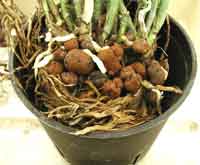 Gently remove plant from
culture pot and inspect the root system. This plant has been over
watered. As you can see, new roots are forming but the old roots are
decaying. | 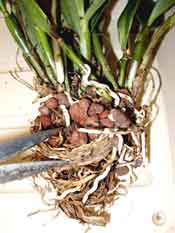 Cut
away the old decaying roots and wash system again. | ||
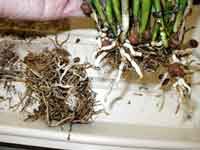 Old roots on left have been removed. New plant on right will be planted again. | 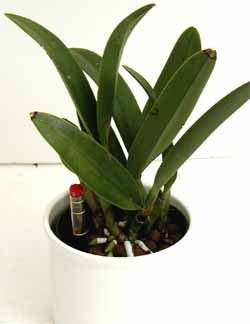 New plant - ready to try
again. | ||
| Watering routine is back to pouring a KLN solution of 2 TBLS per gallon through the root system. Don't allow standing water at the base until you see new growth. | |||
